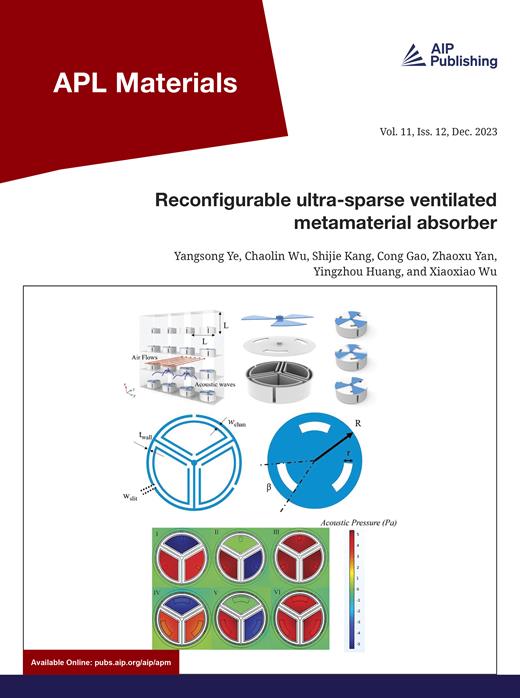Silicon (100) surface passivation-driven tuning of Ag film crystallinity and its impact on the performance of Ag/n-Si mid-infrared Schottky photodetector
IF 5.3
2区 材料科学
Q2 MATERIALS SCIENCE, MULTIDISCIPLINARY
引用次数: 0
Abstract
The utilization of metal/semiconductor Schottky devices for plasmonic harvesting of hot carriers holds immense potential in the field of sub-bandgap photodetection. In this work, we explore a surface passivation scheme using air plasma exposure to modify the Si (100) surface and subsequently the crystal orientation of the deposited Ag film for photon detection in the mid-infrared (MIR) regime. This tailoring was achieved by varying the plasma exposure duration (0, 150, 300, 450, and 600 s). As a result, we could tune the crystal orientation of Ag from the (200) to the (210) crystal plane, with the Ag (111) orientation present in all devices. Furthermore, the photo-response behavior under MIR exposure at λ = 4.2 µm was studied both experimentally and using COMSOL simulations. It was observed that both photoelectric (PE) and photothermal (PT) effects contributed to the photo-response behavior of all devices. The Ag/Si device exposed to air plasma for 300 s exhibited the maximum PE-driven response (2.73 µA/W), while the device exposed to air plasma for 600 s showed a significant PT-driven response (13.01 µA/W). In addition, this strategy helped reduce the reverse leakage current by up to 99.5%. This study demonstrates that MIR detection at longer wavelengths can be optimized by tailoring the crystal orientation of the metal film.硅 (100) 表面钝化驱动的银膜结晶度调整及其对 Ag/n-Si 中红外肖特基光电探测器性能的影响
利用金属/半导体肖特基器件进行热载流子的等离子收集,在亚带隙光子探测领域具有巨大的潜力。在这项工作中,我们探索了一种表面钝化方案,利用空气等离子体曝光来改变硅(100)表面,进而改变沉积银薄膜的晶体取向,以实现中红外(MIR)波段的光子探测。这种定制是通过改变等离子体曝光持续时间(0、150、300、450 和 600 秒)来实现的。因此,我们可以调整银的晶体取向,从(200)晶面到(210)晶面,所有器件中的银取向均为(111)。此外,我们还通过实验和 COMSOL 仿真研究了在 λ = 4.2 µm 的中红外光照射下的光响应行为。结果表明,光电(PE)和光热(PT)效应对所有器件的光反应行为都有影响。暴露在空气等离子体中 300 秒的 Ag/Si 器件表现出最大的 PE 驱动响应(2.73 µA/W),而暴露在空气等离子体中 600 秒的器件则表现出显著的 PT 驱动响应(13.01 µA/W)。此外,这种策略还有助于减少高达 99.5% 的反向漏电流。这项研究表明,可以通过调整金属膜的晶体取向来优化较长波长的近红外检测。
本文章由计算机程序翻译,如有差异,请以英文原文为准。
求助全文
约1分钟内获得全文
求助全文
来源期刊

APL Materials
NANOSCIENCE & NANOTECHNOLOGYMATERIALS SCIE-MATERIALS SCIENCE, MULTIDISCIPLINARY
CiteScore
9.60
自引率
3.30%
发文量
199
审稿时长
2 months
期刊介绍:
APL Materials features original, experimental research on significant topical issues within the field of materials science. In order to highlight research at the forefront of materials science, emphasis is given to the quality and timeliness of the work. The journal considers theory or calculation when the work is particularly timely and relevant to applications.
In addition to regular articles, the journal also publishes Special Topics, which report on cutting-edge areas in materials science, such as Perovskite Solar Cells, 2D Materials, and Beyond Lithium Ion Batteries.
文献相关原料
| 公司名称 | 产品信息 | 采购帮参考价格 |
|---|
 求助内容:
求助内容: 应助结果提醒方式:
应助结果提醒方式:


